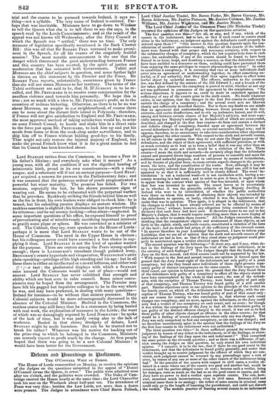Lord STANLEY retires from the Commons, to become a Peer
in his father's lifetime ; and everybody asks what it means ? As a young man, with all the confident if not the dignified bearing of aristocratic birth, proud in its own consciousness—with a ready tongue, and a vehement will if not an earnest purpose—Lord STAN- LEY acquired a renown for prowess in the Parliamentary lists ; and it was assumed that the generous ardour of youth prognosticated a powerful but wiser maturity. The promise has failed. For two sessions, especially the last, he has shown premature signs of wearing out. He seems to be exhausted with the perpetual warfare that he provokes. Recklessly striking the friends behind him as well as the foe in front, his own leaders were obliged to check him : he is tamed, but his subsiding passion displays no mature wisdom. His reckless assertion is slighted ; his bitterness has lost its power through its triteness ; and he sat uneasy-looking—often silent—neglected. In some important questions of his office, he exposed himself to proof of prevaricating and of mischievously sacrificing important interests to gratify some pique or spleen. He was convicted as a minister of evil. The Cabinet, they say, want speakers in the House of Lords : perhaps it is more that Lord STANLEY wants to be out of the House of Commons. The need in the Upper House is obvious ; but his colleagues never could have exercised a free choice in sup- plying it thus. Lord STANLEY is not the kind of speaker wanted for the purpose. There are orators among the Peers strong-spoken enough ; there is LYNDHURST'S trenchant though polished irony, Baononest's ornate hyperbole and vituperation, WELLINGTON'S utter plain-speaking—privilege of his high standing and his age : but in all these there is either an intellectual or a moral loftiness, and either real . of tact : the gladiatorial displays with which a STANLEY once amused the Commons would be out of place—would not answer. Lord STANLEY has never exhibited that strength and ability which are best seen in calm council. Some minor conve- niences may be hoped from the arrangement. The Premier may have felt his gagged but impulsive colleague to be in the way where he was, and may have preferred, in dealing with many questions— Ireland for instance—to be without that sinister presence. Many Colonial subjects would be more advantageously discussed in the absence of the Colonial Minister. Shelved in the Commons, the restless orator may still fancy that he is a statesman by being busied with real work, the explanation of measures in the Lords ; the want of which was so damagingly exposed by Lord NORMANBY : he spoke of the lack of time, but it was partly owing also to the lack of workmen. Busied in that showy drudgery of debate, Lord STANLEY might be made harmless. But can he be trusted not to break his tether? Whatever was his motive for backing out of the prize-ring to which he belonged in the Commons, Ministers can scarcely expect to profit much by the change. At first people hoped that there was going to be a new Colonial Minister : it would have been better for the Government.


























 Previous page
Previous page